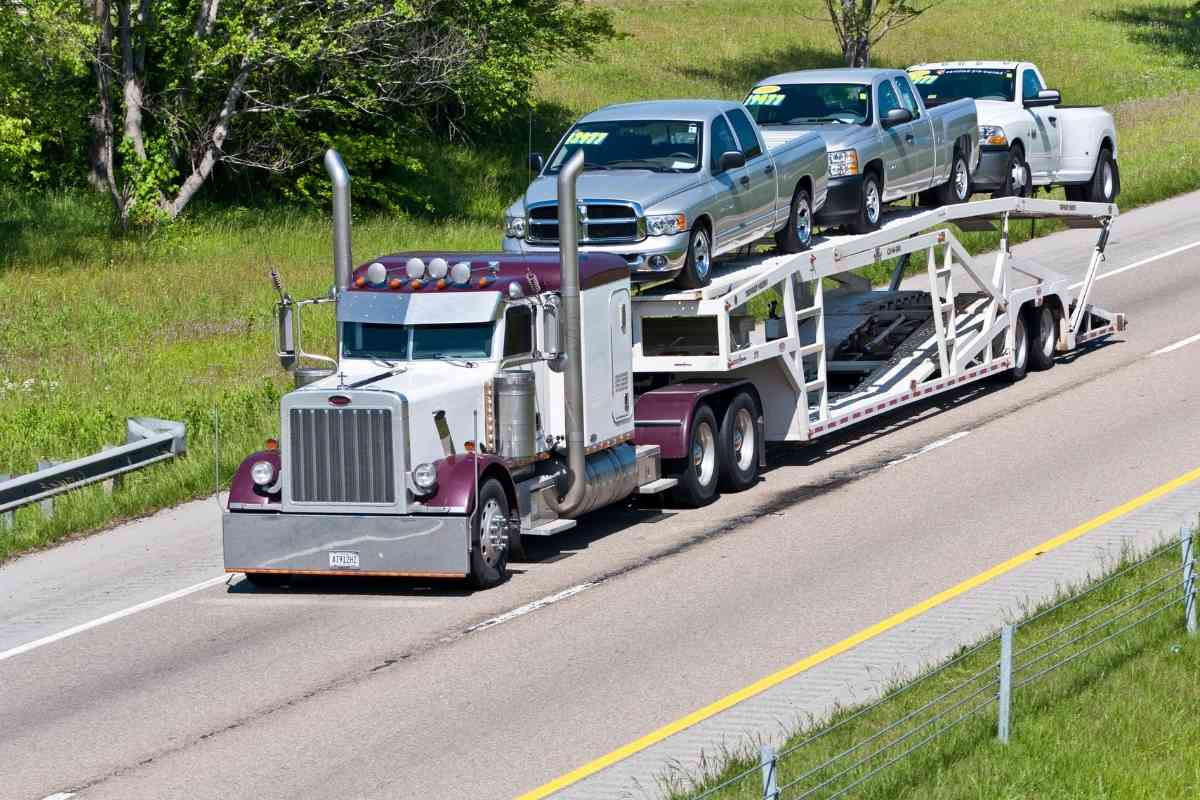How Much Do Pickup Trucks Weigh? A Quick Guide
Pickup trucks often pack a big engine, seating capacity, and a serious payload. But how much do they have to weigh to have those capabilities? Weight has some implications for a vehicle’s performance and abilities. While not likely a major factor in purchase, the weight of a pickup can determine how easy it is to tow and how safe it is.

How Much Do Pickup Trucks Weigh?
Pickups come in a variety of weights, depending on the class. A small pickup truck can weigh around 4500 lbs while a bigger, standard truck can tip the scales at up to 5,500 lbs. A heavier duty truck can start at 6,500 lbs and a 3500HD truck can add some heft at 7,000 lbs or more.
We’ll learn a bit more about trucks and what adds the weight. You might also be curious about how a truck that weighs 5,500 lbs can manage to tow more than its own weight. There are a few other reasons why knowing the weight of a truck can be important.
We’ve towed and used trucks often. We’ll look at manufacturer websites and other sources to learn the source of weight within trucks. We’ll also look at the numbers associated with towing and weight.
Weight can vary between trucks
One difference-maker in the weight of a truck is the cab size. A regular cab truck without a true back seat, and possibly with one or two doors, will be lighter than a double cab or crew cab
A double or crew cab adds some weight with the addition of hardware for a door, and a bench seat. The weight difference here is usually around 200-300 lbs when moving from a regular cab to a double cab, and around 500 lbs when going to a larger crew cab.
How does a pickup truck tow or pull more than its own weight?
The key to this answer is weight distribution. Just like trying to move furniture or other large, heavy objects, having the right leverage is very helpful in letting a 5,500 lbs truck tow more than 10,000 lbs.
A pickup truck like a Chevrolet Silverado or Toyota Tundra has a particular wheelbase, axel strength, suspension, gear ratio, and engine size. When spread out the right way, trucks make it readily possible to add a trailer that connects right to their frame.
When distributed properly between 2 front wheels and sometimes 4 back wheels, a pickup truck can pull up to 2 to 3 times its own weight, like a 6,500 lbs 3500HD truck pulling along a horse trailer or construction supplies weighing 14,000 lbs or more.
What numbers are important in towing?

Towing can make a big pickup truck very useful. Towing also requires a bit of knowledge about the truck and trailer being towed. Knowing your truck and its towing capacity is very important for your safety and the safety of others.
Gross weight
Let’s start with the Gross Combined Vehicle Weight Rating, or GCVWR. The GCVWR is the combined weight of literally everything in your truck and trailer.
You’ll want to consider the weight of the people in your truck, the tools you keep, and anything else that you added. The GCVWR is located in both the user manual and within the driver’s side door jam in the vehicle. While it’s possible to look up the GCVWR online, it’s also easy to find the wrong number because of the variety of packages offered for trucks.
We suggest looking at your vehicle first before looking up your Ford F-150 King Ranch edition.
You’ll also want to know your vehicle’s curb weight. This is the manufacturer’s known weight of your vehicle plus all the fluids that make it run. Note that this is also without people in the truck.
Calculating Tow capacity
How do you calculate tow capacity? Subtract the GCVRW from the curb weight. You’ll need to know how much the trailer weighs and the weight of the vehicle or materials you are towing, too.
These are important because you don’t want to exceed your vehicle’s towing capacity. You are actually better off not towing within 10% of the capacity.
One of the biggest reasons not to tow within 10% of the capacity is because it’s easy to get the weight slightly wrong or forget something. You might also end up throwing something extra in the truck bed that pushes the weight higher.
Just be mindful of your capacity. Traffic can also be unpredictable and make driving with a trailer difficult due to wind or because of vehicles braking suddenly in front of you.
The importance of knowing
Driving with too much weight can be bad. The vehicle’s drivetrain can become overwhelmed and potentially seriously damaged, but more importantly – you could be in danger.
A truck is designed in a specific way to be able to turn and stop with a maximum amount of weight behind it. Adding too much weight could readily compromise your ability to maneuver your truck, which is especially bad in traffic.
An overweight vehicle is a bad news for stopping distance, acceleration, and control. It’s bad news for everyone around you if you can’t keep your vehicle on the road even in sudden, extreme situations.
Is a heavier vehicle safer?
The answer is “kind of.”A heavier vehicle is less likely to be pushed around in a high-speed accident. The reality is that the occupants in larger trucks are more likely to be safe than average is mostly because of their height and compartments.
The distance between the engine compartment and the passengers is greater in a truck than in a sedan or SUV, simply because the engine is bigger. This gives a truck area to absorb the impact of an accident.
A pickup also rides higher, so it is less likely to have the upper parts of the truck – near your head – involved in an accident.
What does the “ton” rating mean?
You might have heard different weight classifications for trucks, including a half-ton, three-quarter-ton, and one ton. These do not refer to the actual weight of the truck – as most all vehicles weigh significantly more than one ton.
You are actually hearing about the payload capacity. The numbers are also not necessarily accurate anymore – and used to be a good way of referring to different loads.
Pretty simple, a “one ton” truck is usually at 3500 while three quarter won is a 2500HD, and a half-ton is a standard pickup truck. You’ll want to look up the actual payload capacity of your truck instead of relying on the general terminology.
Is the weight of a truck important?
The actual weight of a truck shouldn’t be a big factor in deciding which one to get. If you are concerned about the towing capacity, you’ll notice that the larger vehicles are heavier, but also offer a higher gross weight.
In other words, selecting a bigger, heavier truck shouldn’t remove tow capacity – it should add much more.
Otherwise, the weight of a truck adds some small but completely expected disadvantages. A truck with more weight also has a bigger engine, often with a 5.3L 8-cylinder or more, often north of a 6.2 liter – and uses more gas.
Of course, given the alternative of not being able to move large machinery or trailers, it’s totally worth it, because the task is otherwise impossible.
The only situation in which a vehicle’s weight might matter is on certain roads that have weight restrictions. These weight restrictions are rather unlikely to apply to any truck 3500HD or lower and usually refer instead to semis and box trucks.
We feel that most users seeking information about trucks are more likely to be looking for amenities and capabilities. Weight is an interesting fact for a truck, but it’s unlikely to have any impact on the truck’s overall performance or your use of it, besides knowing about towing.
What parts of a truck are heavy?
As with most vehicles, the engines can be one of the heaviest parts of a vehicle. Engines are made mostly of metal – often heavy metal capable of withstanding all kinds of weather and internal explosions while remaining running.
A truck’s frame is also heavier than that of a car, in part because of the need to accommodate a higher vehicle, a bed, and the potential for towing.
The vehicle’s axle will also be heavier than you expect. There is also a measurement called gross axle weight that relates to how much weight you can place directly over the axle. A truck axle can weigh hundreds of pounds to accommodate the need to carry a load directly overhead.
